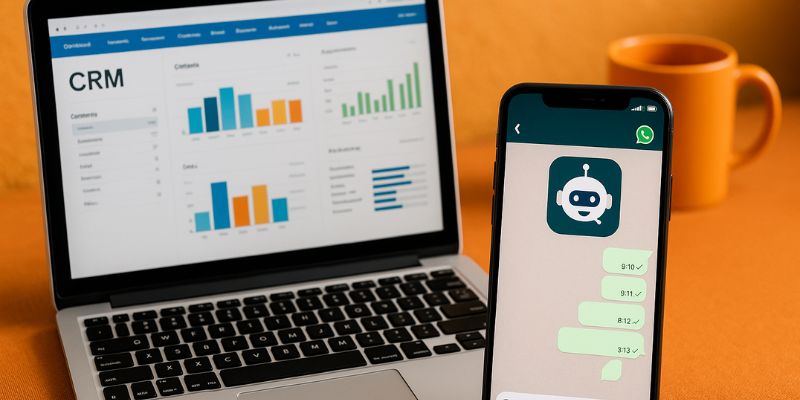Integrate Chatbots with CRM Platforms via WhatsApp
In the ever-evolving digital landscape, businesses are continually seeking efficient ways to enhance customer interactions, streamline operations, and boost sales. Integrating chatbots with CRM platforms via WhatsApp represents a significant leap forward in achieving these objectives. This article delves into the intricacies of this integration, offering insights into its benefits, implementation steps, and real-world applications.
Why Integrate Chatbots with CRM Platforms via WhatsApp?
WhatsApp, with its massive user base, offers businesses a robust platform to engage with customers effectively. By integrating chatbots with CRM platforms through WhatsApp, companies can automate customer interactions, enhance data collection, and improve customer service efficiency.
- Enhanced Customer Engagement: Chatbots allow for 24/7 customer support, ensuring that inquiries are addressed promptly. This constant availability leads to improved customer satisfaction and loyalty.
- Data Collection and Analysis: By integrating with CRM, chatbots can collect valuable data during interactions, which can be analyzed to gain insights into customer preferences and behaviors.
- Cost Efficiency: Automating customer interactions reduces the need for a large customer service team, leading to significant cost savings for businesses.
Steps to Integrate Chatbots with CRM Platforms via WhatsApp
Implementing this integration involves several crucial steps, each requiring careful planning and execution.
- Choose the Right CRM Platform: Evaluate CRM platforms that offer robust integration capabilities. Consider factors such as scalability, ease of use, and compatibility with your existing systems.
- Select a Suitable Chatbot Framework: Choose a chatbot framework that aligns with your business needs. Popular options include Dialogflow, Microsoft Bot Framework, and IBM Watson Assistant.
- Utilize WhatsApp Business API: Apply for access to the WhatsApp Business API, which enables integration with CRM and chatbot platforms. This step is crucial as it provides the necessary tools for seamless communication.
- Develop the Chatbot: Design the chatbot’s conversational flow, ensuring it can handle common customer queries. Incorporate natural language processing (NLP) to enhance its understanding capabilities.
- Integrate with CRM: Establish a connection between the chatbot, WhatsApp, and your CRM system. This integration ensures that customer data collected via conversations is automatically logged and updated.
- Test and Optimize: Conduct thorough testing to ensure the chatbot functions as intended. Gather feedback from users to identify areas for improvement and make necessary adjustments.
Real-World Applications and Benefits
The integration of chatbots with CRM platforms via WhatsApp is being utilized across various industries, demonstrating its versatility and effectiveness.
- Retail Industry: Retailers use chatbots to manage customer inquiries, track orders, and provide personalized product recommendations, enhancing the overall shopping experience.
- Financial Services: Banks and financial institutions employ chatbots to assist with customer queries, provide account information, and facilitate transactions, improving service delivery.
- Healthcare Sector: Healthcare providers leverage chatbots to schedule appointments, offer medical advice, and manage patient records, streamlining administrative processes.
Challenges and Considerations
While the integration of chatbots with CRM platforms via WhatsApp offers numerous benefits, it also presents certain challenges.
- Data Privacy: Businesses must ensure compliance with data protection regulations to safeguard customer information.
- Technical Complexity: The integration process can be technically demanding, requiring expertise and resources to implement effectively.
- User Acceptance: Encouraging customers to embrace chatbot interactions may require educating them on the benefits and ease of use.
Future Trends in Chatbot and CRM Integration
The future of chatbot and CRM integration via WhatsApp is promising, with several trends emerging that will shape its evolution.
- AI and Machine Learning: The incorporation of AI and machine learning will enhance chatbot capabilities, making interactions more intuitive and personalized.
- Omnichannel Integration: Future integrations will likely extend beyond WhatsApp, incorporating multiple channels to provide a seamless customer experience.
- Improved Analytics: Advanced analytics tools will offer deeper insights into customer interactions, enabling businesses to make data-driven decisions.
Conclusion
Integrating chatbots with CRM platforms via WhatsApp is a strategic move that can transform customer engagement and operational efficiency. By leveraging this technology, businesses can offer round-the-clock support, gather valuable data, and optimize their customer service processes. As technology continues to evolve, this integration will become increasingly sophisticated, offering even greater benefits to businesses that embrace it.
FAQs
What are the benefits of integrating chatbots with CRM via WhatsApp?
It enhances customer engagement, improves data collection, and reduces costs by automating interactions.
How does this integration improve customer service?
By providing 24/7 support and immediate responses to customer inquiries, leading to higher satisfaction.
What industries can benefit from this integration?
Industries such as retail, financial services, and healthcare can significantly benefit from this integration.
What challenges might businesses face during integration?
Challenges include data privacy concerns, technical complexity, and achieving user acceptance.
What future trends are expected in chatbot and CRM integration?
AI and machine learning advancements, omnichannel integration, and improved analytics are key trends.
